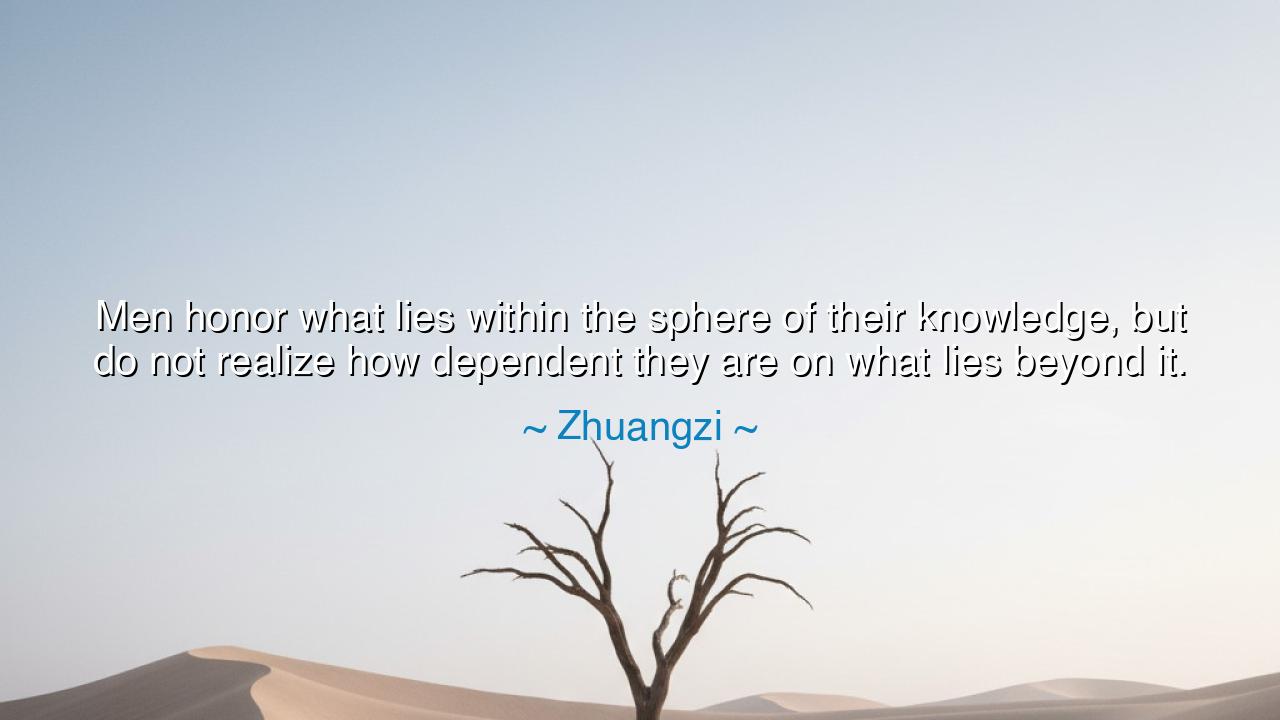
Men honor what lies within the sphere of their knowledge, but do
Men honor what lies within the sphere of their knowledge, but do not realize how dependent they are on what lies beyond it.






Zhuangzi, the sage who dreamed of being a butterfly, spoke with the voice of eternity when he declared: “Men honor what lies within the sphere of their knowledge, but do not realize how dependent they are on what lies beyond it.” In this saying, he reminds us of the arrogance of the human mind, which clings to what it knows as though it were the whole of truth, yet forgets that the vast unknown sustains and surrounds all that we see. Knowledge is a lantern in the dark, but beyond its circle stretches an endless night, without which the light itself would have no meaning.
The ancients understood that the greatest danger to wisdom is not ignorance, but the illusion of certainty. The scholar who knows a handful of scrolls believes he has mastered learning, forgetting that the library of the universe cannot be contained in any hall of man. The farmer honors the soil he tills but forgets the unseen clouds that bring the rain, the distant sun that gives warmth, the unseen gravity that binds all things. Zhuangzi’s words pierce this forgetfulness: that what we know is small, and what we depend upon, vast.
Consider the story of Isaac Newton, who uncovered the laws of gravity and motion. He was hailed as the master of the cosmos, yet he himself confessed that he was but a child playing with pebbles on the shore, while the great ocean of truth lay undiscovered before him. His discoveries reshaped the world, yet even Newton knew that beyond his sphere of knowledge was an immeasurable expanse on which his own learning depended. Here we see Zhuangzi’s wisdom alive in history: the humble recognition that the unknown gives meaning to the known.
There is also warning in the sage’s words. Nations and leaders have fallen because they trusted too much in what they thought they knew, blind to what lay beyond their grasp. The generals of Napoleon, certain of their mastery of Europe, marched into the Russian winter, unprepared for a force beyond their knowledge—cold, distance, and hunger. Their pride in their own science of war blinded them to the greater truth: that men are always at the mercy of what lies beyond their calculations. In this, Zhuangzi teaches that humility is the companion of survival.
The lesson is profound: we must honor not only what we know, but also the mystery that sustains us. To recognize our dependence on what lies beyond is to walk with reverence. For it is the unseen roots that feed the tree, the hidden springs that nourish the river, the silent truths beyond our grasp that hold the world together. The wise man bows not only to his own knowledge, but to the immeasurable depths that remain beyond him.
Practical actions follow from this teaching. In your studies, do not boast of what you know, but remain open to what you do not. In your work, remember that unseen forces—chance, mystery, the labor of others—contribute to your success. In your life, practice humility: ask questions, listen deeply, respect perspectives beyond your own. For every piece of knowledge you possess rests upon countless unknowns that make it possible.
Thus, children of the future, carry Zhuangzi’s wisdom within you: men honor what lies within their knowledge, yet live by what lies beyond it. Do not cling too tightly to the circle of light, for it is the surrounding darkness that gives it shape. Walk in wonder, walk in humility, and let your heart bow to the unseen as much as your mind clings to the known. In this way, you will not only be learned, but truly wise, and your life will shine with reverence for the mystery that makes all things possible.






AAdministratorAdministrator
Welcome, honored guests. Please leave a comment, we will respond soon